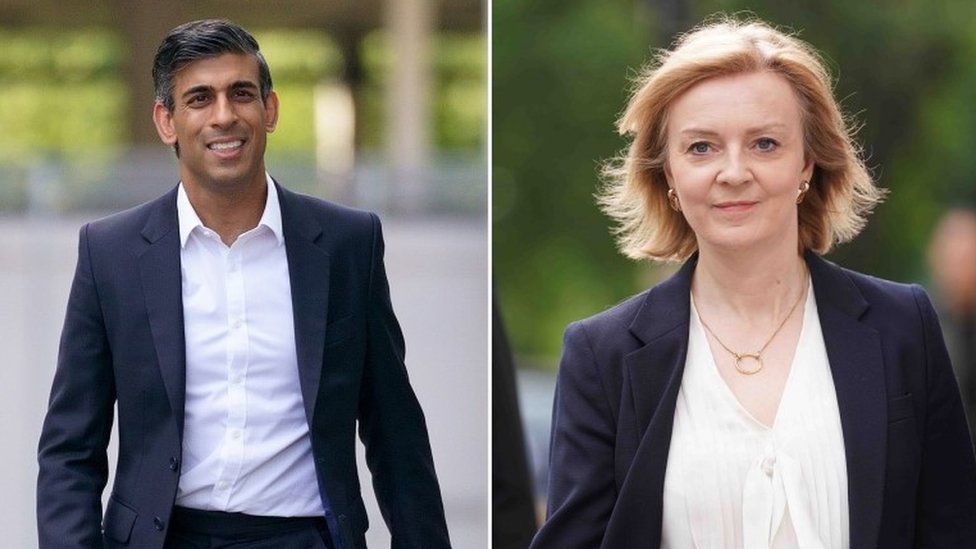The Tory leadership rivals clash over their plans to tackle the cost of living crisis.
 Image source, PA Media
Image source, PA MediaRishi Sunak has criticised Liz Truss’ economic plans, saying she cannot afford tax cuts and a support package to help tackle rising energy bills.
His Tory leadership rival would have to raise borrowing to dangerous levels, risking higher inflation, he said.
With less than two weeks until votes close, it has emerged an emergency budget planned by Ms Truss may not be accompanied by independent forecasts.
Her team said “immediate action” is needed to address the cost of living.
The ballot of party members closes on 2 September – a week on Friday – with the winner being announced on 5 September.
It is unclear how many members there are, but about 160,000 people were eligible to vote during the last Tory leadership election in 2019 and the party says that number has since grown.
Having previously focused on tax cuts, Ms Truss and her allies are talking more about the cost of living crisis and what help her premiership could offer to households.
The foreign secretary said she will tackle the crisis by reversing the National Insurance rise, suspending the green levy element of energy bills and cancelling a planned rise in corporation tax.
Mr Sunak, the former chancellor, said getting control of inflation is the most pressing issue, and he has promised to reduce VAT on domestic energy bills from 5% to zero and to cut 3p off income tax by 2029.
The Institute for Fiscal Studies has called pledges by both leadership candidates “unrealistic” unless they are matched by spending cuts.
Mr Sunak’s campaign has criticised the economic policies championed by Ms Truss.
A campaign spokesperson said: “Following weeks of rejecting direct support payments as ‘handouts’, Truss supporters have slowly woken up to the reality of what winter brings.
“They now say that they will provide people with help – but what help for who, when and how it will be paid for remains a mystery.”
Under Ms Truss’ leadership, an emergency budget may not include the usual economic forecasts from the independent Office for Budget Responsibility (OBR).
“The cost of living crisis means immediate action is required,” a spokeswoman for Ms Truss’ campaign said.
“A Truss government would seek to act as soon as possible to help people across the UK, by cutting taxes and introducing a temporary moratorium on energy levies.”
Last month, the OBR warned that UK government debt is already on an “unsustainable path” because of inflation and other factors.
Mr Sunak’s spokesperson said that Ms Truss cannot deliver both a support package and £50bn worth of unfunded tax cuts in one go, adding that to do so would increase borrowing, jeopardise the public finances and increase inflation.
“It’s no wonder they want to avoid independent scrutiny of the OBR in their emergency budget – they know you can’t do both and it’s time they came clean about that now,” the spokesperson added.
Ms Truss’ campaign defended her economic plan as “sensible”.
A spokesperson added: “We need a new approach to the economy, we need to challenge the failing economic orthodoxy and we need to deliver the necessary reform to tackle inflation and achieve sustainable growth.”
The cost of living crisis is being driven by several factors, including soaring energy bills and inflation outstripping wage increases.
Last week, the UK’s inflation rate hit 10.1%, with rising food and drink prices making the largest contribution to the change.

- FOOTBALL’S PSYCHOLOGY EVOLUTION: ‘In the future, every player will have their own psychologist’
- FRUIT AND VEGETABLE SAFETY: Do we really need to wash them before eating?
